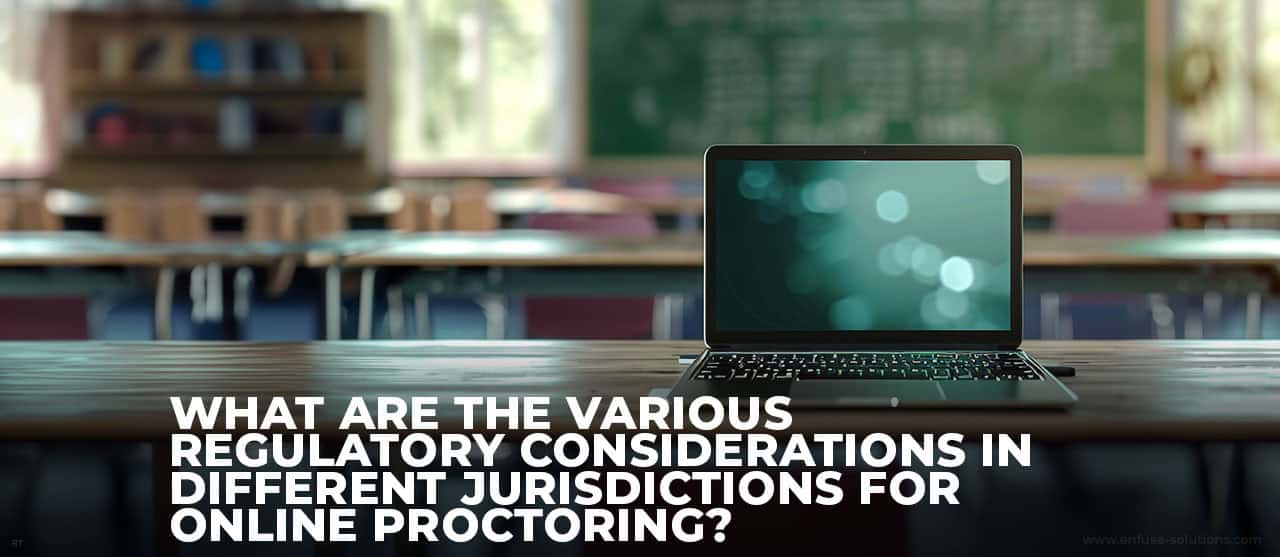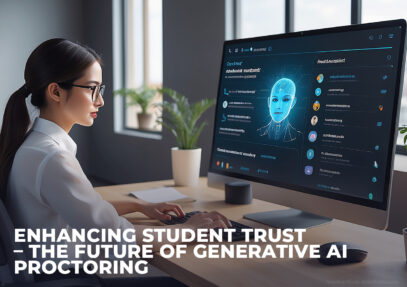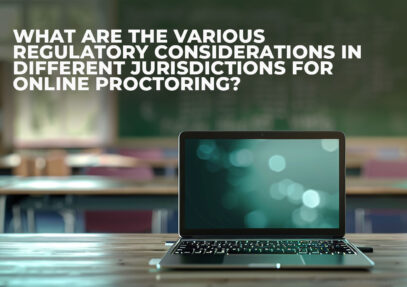
Incorporating online proctoring has become prevalent for administering remote examinations and evaluations. As more educational institutions, universities, and corporations adopt this innovation, it is important to understand the regulatory concerns in different jurisdictions.
Compliance with laws, protocols, and directives regarding online proctoring is essential in each specific region or nation. Organizations should carefully consider regulatory implications when implementing online proctoring in multiple jurisdictions and address the legal and ethical aspects of this technology.
Core Regulatory Areas
-
Data Privacy
Examining candidates through online proctoring poses substantial apprehensions regarding data confidentiality as it acquires personal data throughout assessments. With the utilization of online proctoring, it archives videos, audio, and screen content. These recordings not only seize individuals but also their environments, potentially uncovering intimate or delicate details.
Online proctoring platforms obtain a wide array of information, such as facial expressions, eye movements, keystrokes, and biometric data like fingerprints in order to detect any fraudulent actions. Individuals raise apprehensions regarding the potential violation of their privacy or the vulnerability of this data to exploitation.
Educators should educate students about the types of data collected, the intended purposes for its use, and their rights regarding the management of their data to maintain data privacy in online proctoring. Clear and transparent privacy policies should be provided, and explicit consent from students should be obtained before conducting online proctored examinations.
-
Data Security
Online proctoring systems must prioritize the implementation of robust security protocols to comply with data privacy regulations. This entails utilizing sophisticated encryption techniques to safeguard data both at rest and in transit, effectively deterring unauthorized entry to classified information.
Furthermore, strict measures ought to be enforced that permit access solely for authorized individuals with a legitimate requirement for sensitive data. Using strong transmission protocols such as HTTPS remains essential in guaranteeing the encryption of data during its transfer between your device and the proctoring server, shielding against potential eavesdropping or tampering.
-
Accessibility
In order to guarantee equal access to educational resources and assessments for all students, regardless of disabilities, online education must prioritize accessibility. Therefore, during the creation and implementation of virtual proctoring platforms, it is imperative to ensure utmost accessibility in order to successfully accommodate the diverse needs of students.
Developing an inclusive and accessible virtual monitoring journey for individuals with disabilities requires adhering to accessibility protocols, such as the Web Content Accessibility Guidelines (WCAG). This includes creating user interfaces compatible with assistive tools like magnifiers and screen readers to accommodate various impairments. Additionally, ensuring equitable access during remote proctored assessments involves providing alternatives such as closed captions for videos or transcripts for audio recordings.
Navigating Jurisdictional Variations
-
The United States
The United States sphere of online proctoring is governed by an intricate network of state laws and federal regulations that safeguard student data privacy and regulate virtual education. Educational institutions must skillfully navigate through a labyrinth of legal frameworks to ensure adherence, as there is currently no comprehensive federal approach solely focused on online proctoring.
States such as Illinois have implemented regulations, like the Student Online Privacy Protection Act (SOPPA), to safeguard the privacy of student data during online examinations. At the national level, institutions depend on legislation like the Family Educational Rights and Privacy Act (FERPA) which provides rigorous directives surrounding the collection, utilization, and disclosure of student information.
The strictest adherence and the students’ consent are compulsory for empowering them through control of their personal information. Organizations such as the IMS Global Learning Consortium play a pivotal role in setting industry standards that are widely adopted by institutions throughout the United States. This esteemed consortium is renowned for its efforts in creating interoperable standards within the field of educational technology.
-
The European Union
The online proctoring aspect of education is subject to the jurisdiction of the General Data Protection Regulation (GDPR), a sweeping legislation that safeguards personal information within European Union (EU) borders. As it encompasses all member states, this regulation imposes rigorous guidelines regarding the acquisition, utilization, and preservation of sensitive data.
In order to adhere to GDPR regulations in the EU, organizations must prioritize transparency, acquire informed consent from students for the gathering of data, bolster security measures to thwart breaches and unauthorized entry and limit the storage and transmission of data in order to safeguard privacy.
Furthermore, institutions must subject online proctoring service providers to rigorous scrutiny to ensure alignment with GDPR stipulations. Contracts inked with service providers should incorporate clauses mandating GDPR compliance and mechanisms facilitating oversight of data protection.
-
Asia
The online proctoring regulations in Asia exhibit significant variability, stemming from the intricacies of legal frameworks and cultural nuances. In India specifically, universities hold data security enhancements for virtual exams at high importance, as directed by the Information Technology Act (2000) which centers around safeguarding sensitive information and fortifying cybersecurity measures.
Meanwhile, China implements precise regulations to control online examinations. These regulations take into account variables such as the type of exam and administering body. They encompass stringent mandates for authentication, data encryption, and surveillance protocols in order to safeguard the integrity of exams.
Amid the ever-changing regulations surrounding online proctoring in Asia, there is a constant struggle to find an equilibrium between the promotion of innovation and the protection of individuals’ privacy. As digital education flourishes in this region, it becomes apparent that clear protocols are imperative in navigating through the intricacies of online proctoring while upholding student liberties and preserving sensitive data.
Conclusion
It is crucial for educational and corporate entities to acknowledge the prevalence of utilizing remote proctoring in assessments. Prioritizing ethical considerations, transparency, and stakeholder engagement extends beyond legal obligations and is imperative in ensuring responsible integration of this technology.
Proactively addressing concerns regarding data privacy, security, and accessibility builds trust and credibility and promotes an equitable environment that upholds individual rights. Institutions that stay updated with regulations and embrace ongoing enhancement demonstrate dedication to moral action and honesty in implementing online proctoring.
EnFuse understands the growing trend of remote learning and the challenge educational institutions face in maintaining exam integrity. That’s why we offer secure and efficient proctoring solutions tailored to organizations and universities worldwide. Our solutions provide reliability and security to meet various assessment requirements.
EnFuse Solutions offers highly configurable tools and advanced AI-powered technology for remote assessment. Whether you want to integrate proctoring into existing systems or use standalone solutions, we have the expertise to make it happen. Contact us today to learn more and get started with secure online exams using EnFuse Solutions’ flexible tools and cutting-edge AI technology.

















Comment